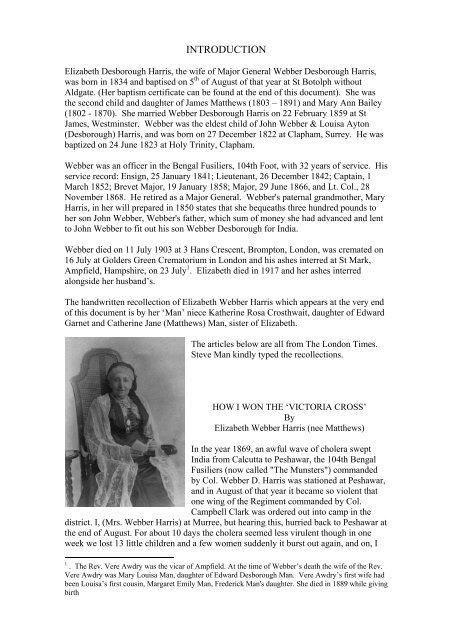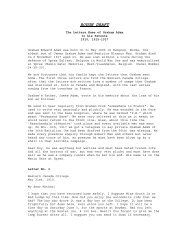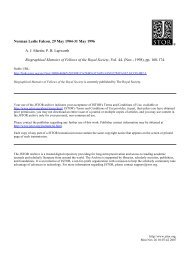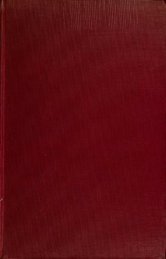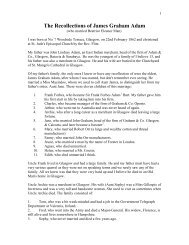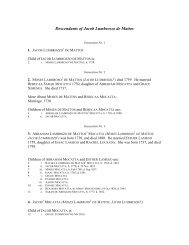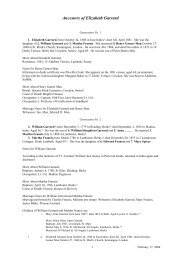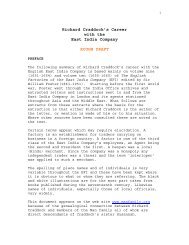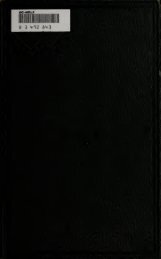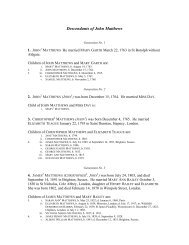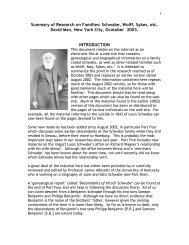this is an account written by the niece of mrs webber harris
this is an account written by the niece of mrs webber harris
this is an account written by the niece of mrs webber harris
- No tags were found...
Create successful ePaper yourself
Turn your PDF publications into a flip-book with our unique Google optimized e-Paper software.
INTRODUCTION<br />
Elizabeth Desborough Harr<strong>is</strong>, <strong>the</strong> wife <strong>of</strong> Major General Webber Desborough Harr<strong>is</strong>,<br />
was born in 1834 <strong>an</strong>d bapt<strong>is</strong>ed on 5 th <strong>of</strong> August <strong>of</strong> that year at St Botolph without<br />
Aldgate. (Her bapt<strong>is</strong>m certificate c<strong>an</strong> be found at <strong>the</strong> end <strong>of</strong> <strong>th<strong>is</strong></strong> document). She was<br />
<strong>the</strong> second child <strong>an</strong>d daughter <strong>of</strong> James Mat<strong>the</strong>ws (1803 – 1891) <strong>an</strong>d Mary Ann Bailey<br />
(1802 - 1870). She married Webber Desborough Harr<strong>is</strong> on 22 February 1859 at St<br />
James, Westminster. Webber was <strong>the</strong> eldest child <strong>of</strong> John Webber & Lou<strong>is</strong>a Ayton<br />
(Desborough) Harr<strong>is</strong>, <strong>an</strong>d was born on 27 December 1822 at Clapham, Surrey. He was<br />
baptized on 24 June 1823 at Holy Trinity, Clapham.<br />
Webber was <strong>an</strong> <strong>of</strong>ficer in <strong>the</strong> Bengal Fusiliers, 104th Foot, with 32 years <strong>of</strong> service. H<strong>is</strong><br />
service record: Ensign, 25 J<strong>an</strong>uary 1841; Lieuten<strong>an</strong>t, 26 December 1842; Captain, 1<br />
March 1852; Brevet Major, 19 J<strong>an</strong>uary 1858; Major, 29 June 1866, <strong>an</strong>d Lt. Col., 28<br />
November 1868. He retired as a Major General. Webber's paternal gr<strong>an</strong>dmo<strong>the</strong>r, Mary<br />
Harr<strong>is</strong>, in her will prepared in 1850 states that she bequeaths three hundred pounds to<br />
her son John Webber, Webber's fa<strong>the</strong>r, which sum <strong>of</strong> money she had adv<strong>an</strong>ced <strong>an</strong>d lent<br />
to John Webber to fit out h<strong>is</strong> son Webber Desborough for India.<br />
Webber died on 11 July 1903 at 3 H<strong>an</strong>s Crescent, Brompton, London, was cremated on<br />
16 July at Golders Green Crematorium in London <strong>an</strong>d h<strong>is</strong> ashes interred at St Mark,<br />
Ampfield, Hampshire, on 23 July 1 . Elizabeth died in 1917 <strong>an</strong>d her ashes interred<br />
alongside her husb<strong>an</strong>d’s.<br />
The h<strong>an</strong>d<strong>written</strong> recollection <strong>of</strong> Elizabeth Webber Harr<strong>is</strong> which appears at <strong>the</strong> very end<br />
<strong>of</strong> <strong>th<strong>is</strong></strong> document <strong>is</strong> <strong>by</strong> her ‘M<strong>an</strong>’ <strong>niece</strong> Ka<strong>the</strong>rine Rosa Crosthwait, daughter <strong>of</strong> Edward<br />
Garnet <strong>an</strong>d Ca<strong>the</strong>rine J<strong>an</strong>e (Mat<strong>the</strong>ws) M<strong>an</strong>, s<strong>is</strong>ter <strong>of</strong> Elizabeth.<br />
The articles below are all from The London Times.<br />
Steve M<strong>an</strong> kindly typed <strong>the</strong> recollections.<br />
HOW I WON THE ‘VICTORIA CROSS’<br />
By<br />
Elizabeth Webber Harr<strong>is</strong> (nee Mat<strong>the</strong>ws)<br />
In <strong>the</strong> year 1869, <strong>an</strong> awful wave <strong>of</strong> cholera swept<br />
India from Calcutta to Peshawar, <strong>the</strong> 104th Bengal<br />
Fusiliers (now called "The Munsters") comm<strong>an</strong>ded<br />
<strong>by</strong> Col. Webber D. Harr<strong>is</strong> was stationed at Peshawar,<br />
<strong>an</strong>d in August <strong>of</strong> that year it became so violent that<br />
one wing <strong>of</strong> <strong>the</strong> Regiment comm<strong>an</strong>ded <strong>by</strong> Col.<br />
Campbell Clark was ordered out into camp in <strong>the</strong><br />
d<strong>is</strong>trict. I, (Mrs. Webber Harr<strong>is</strong>) at Murree, but hearing <strong>th<strong>is</strong></strong>, hurried back to Peshawar at<br />
<strong>the</strong> end <strong>of</strong> August. For about 10 days <strong>the</strong> cholera seemed less virulent though in one<br />
week we lost 13 little children <strong>an</strong>d a few women suddenly it burst out again, <strong>an</strong>d on, I<br />
1 . The Rev. Vere Awdry was <strong>the</strong> vicar <strong>of</strong> Ampfield. At <strong>the</strong> time <strong>of</strong> Webber’s death <strong>the</strong> wife <strong>of</strong> <strong>the</strong> Rev.<br />
Vere Awdry was Mary Lou<strong>is</strong>a M<strong>an</strong>, daughter <strong>of</strong> Edward Desborough M<strong>an</strong>. Vere Awdry’s first wife had<br />
been Lou<strong>is</strong>a’s first cousin, Margaret Emily M<strong>an</strong>, Frederick M<strong>an</strong>'s daughter. She died in 1889 while giving<br />
birth
think (for I c<strong>an</strong>not quite remember <strong>the</strong> exact date) <strong>the</strong> 10th September, <strong>the</strong> Headquarters<br />
were ordered into camp. We were to march at 3a.m. next morning. I was to await my<br />
husb<strong>an</strong>d with <strong>the</strong> regiment, outside <strong>the</strong> Artillery Hospital; my ayee was with me, <strong>an</strong>d I<br />
had to wait nearly <strong>an</strong> hour. We were not allowed to march along <strong>the</strong> gr<strong>an</strong>d trunk road<br />
for fear <strong>of</strong> leaving a trail <strong>of</strong> infection.<br />
The Quarter Master had marked out a camp about 7 miles <strong>of</strong>f, but <strong>the</strong> sun was high<br />
when we got <strong>the</strong>re. I d<strong>is</strong>mounted <strong>an</strong>d went into my tent, when I saw a soldier fall to <strong>the</strong><br />
ground. I called my serv<strong>an</strong>ts; we picked him up <strong>an</strong>d sent for <strong>the</strong> Doctor. Unhappily we<br />
had only one with us, so he was sometime coming. The poor m<strong>an</strong> was in a collapse<br />
from cholera, <strong>an</strong>d quite unconscious. While waiting, I got some mustard, tore my<br />
h<strong>an</strong>dkerchief in half <strong>an</strong>d put on 2 mustard plasters, <strong>an</strong>d <strong>the</strong> Doctor arriving, he was sent<br />
<strong>of</strong>f to hospital, <strong>an</strong>d am th<strong>an</strong>kful to say he eventually recovered.<br />
That night we lost twenty-seven men, who had to be buried on <strong>th<strong>is</strong></strong> ground. Next<br />
morning, about 3 am we marched to <strong>an</strong>o<strong>the</strong>r spot. The men were all very much<br />
d<strong>is</strong>pirited <strong>an</strong>d as <strong>the</strong> Colonel <strong>an</strong>d I were walking in <strong>the</strong> lines at dusk, he suggested we<br />
might have a sing-song, <strong>of</strong>fering prizes to <strong>the</strong> m<strong>an</strong> who s<strong>an</strong>g <strong>the</strong> best song. It was<br />
hurriedly arr<strong>an</strong>ged, <strong>an</strong>d a committee <strong>of</strong> serge<strong>an</strong>ts formed to adjudge <strong>the</strong> prizes. At 9 pm.<br />
we all assembled. The men formed a ring, into <strong>the</strong> centre <strong>of</strong> which <strong>the</strong> m<strong>an</strong> stepped<br />
who was to sing. A chair was brought for me as I was to present <strong>the</strong> prizes. It all went<br />
merrily, but <strong>the</strong> night was so intensely hot that soon after eleven, we adjourned. When I<br />
came to <strong>the</strong> last prize, (<strong>the</strong>y were all in money) <strong>the</strong> poor m<strong>an</strong> who should have received<br />
it was not <strong>the</strong>re; he died <strong>of</strong> cholera.<br />
Next morning we marched again, <strong>an</strong>d so went on till we got to <strong>the</strong> foot <strong>of</strong> a hill called<br />
Cherat, where <strong>the</strong> o<strong>the</strong>r wing, which happily had only had one fatal case since leaving<br />
Peshawar, joined us. There we remained till <strong>the</strong> Doctor considered we were not<br />
infectious, but alas, we had lost a third <strong>of</strong> <strong>the</strong> men who marched from Peshawar with us,<br />
<strong>an</strong>d on <strong>the</strong> day we left for Cherat, our dear young Ass<strong>is</strong>t<strong>an</strong>t Surgeon, "M<strong>an</strong>sell" <strong>by</strong><br />
name, was seized <strong>an</strong>d for some hours we feared we should lose him. Happily he<br />
recovered <strong>the</strong>n, but to succumb to a relapse a week afterwards. We remained at Cherat<br />
till <strong>the</strong> 9th December, when we marched back to Peshawar, arriving <strong>the</strong>re on <strong>the</strong> 12th.<br />
Everybody made much <strong>of</strong> me, because, I think, I had not<br />
seen <strong>an</strong>o<strong>the</strong>r wom<strong>an</strong>'s face for three months! <strong>an</strong>d <strong>the</strong>n I<br />
heard that <strong>the</strong> <strong>of</strong>ficers <strong>of</strong> <strong>the</strong> regiment had sent home for a<br />
gold Victoria Cross for me. When it arrived, it proved to<br />
be <strong>an</strong> exact replica <strong>of</strong> a V.C. in gold, with <strong>th<strong>is</strong></strong> inscription<br />
on <strong>the</strong> back –<br />
"Presented to Mrs Webber Harr<strong>is</strong> <strong>by</strong> <strong>the</strong> <strong>of</strong>ficers <strong>of</strong> <strong>the</strong><br />
104th Bengal Fusiliers, for her indomitable pluck, during<br />
<strong>the</strong> cholera epidemic <strong>of</strong> 1869."<br />
It <strong>is</strong> a most beautiful ornament, <strong>an</strong>d will always be my<br />
most cher<strong>is</strong>hed possession. General Sir Samuel Brown,<br />
himself a V.C. <strong>an</strong>d who was comm<strong>an</strong>ding <strong>the</strong> Station,<br />
asked to be allowed to come to <strong>an</strong> informal meeting at our<br />
own house, when he presented it to me, at <strong>the</strong> request <strong>of</strong> <strong>the</strong> Officers, in a very pretty<br />
speech, in which he said h<strong>is</strong> only regret was that <strong>the</strong>y had not had "For Pluck" put on
<strong>the</strong> ribbon in diamonds. Since <strong>the</strong>n Lord Roberts has most kindly congratulated me on<br />
winning such a d<strong>is</strong>tinction.<br />
THIS IS AN ACCOUNT WRITTEN<br />
BY THE NIECE OF MRS WEBBER HARRIS<br />
At <strong>the</strong> end <strong>of</strong> 1868, middle <strong>of</strong> September, <strong>the</strong> regiment was ordered from Dugshai to<br />
Peshawar, which latter place we entered on December 12th 1868. Early in following hot<br />
wea<strong>the</strong>r, grave rumours arose <strong>of</strong> <strong>the</strong> prevalence <strong>of</strong> cholera, which beg<strong>an</strong> in Calcutta,<br />
sweeping through <strong>the</strong> whole <strong>of</strong> India.<br />
On <strong>the</strong> 24th July that year, my husb<strong>an</strong>d (<strong>the</strong>n Col. Webber Harr<strong>is</strong>) lost h<strong>is</strong> uncle,<br />
General Philip Harr<strong>is</strong>, comm<strong>an</strong>ding <strong>the</strong> div<strong>is</strong>ion at Allahabad, <strong>of</strong> <strong>the</strong> same d<strong>is</strong>ease. We<br />
also got very attacks <strong>of</strong> Peshawar fever in <strong>the</strong> station; I, for <strong>the</strong> first time <strong>of</strong> my being in<br />
India, fell ill with it. My husb<strong>an</strong>d took me up Murree in July, <strong>an</strong>d left me <strong>the</strong>re with<br />
some cousins <strong>of</strong> h<strong>is</strong>, a doctor <strong>an</strong>d Mrs. Currie. Soon afterwards I heard rumours <strong>of</strong><br />
cholera being bad in Peshawar. Finding that Captain Cor<strong>by</strong>n (Mrs Currie's bro<strong>the</strong>r) was<br />
going down <strong>the</strong> hill, I asked him to take me with him, <strong>an</strong>d wired to my husb<strong>an</strong>d to meet<br />
me at Rawalpindi which he did, <strong>an</strong>d was at first somewhat vexed with me, but I soon<br />
saw he was really relieved I was <strong>the</strong>re. He told me <strong>the</strong>re had been a good m<strong>an</strong>y cases in<br />
<strong>the</strong> regiment, but he thought if I went about among <strong>the</strong> women as usual <strong>an</strong>d v<strong>is</strong>ited <strong>the</strong>m<br />
in hospital, <strong>the</strong> regiment would gain confidence.<br />
One wing <strong>of</strong> <strong>the</strong> regiment, having suffered severely had already been sent into <strong>the</strong><br />
d<strong>is</strong>trict. We got back to Peshawar, <strong>an</strong>d for about ten days <strong>the</strong>re were but few cases.<br />
Then suddenly it became very bad. We lost thirteen little children <strong>an</strong>d several women in<br />
one week. The o<strong>the</strong>r Engl<strong>is</strong>h regiment (<strong>the</strong> 34th) suffered equally badly, but <strong>the</strong><br />
difficulty was for <strong>the</strong> general (Sir Samuel Brown V.C.) to find tr<strong>an</strong>sport for us all. The<br />
orders came for us to march at Sam. We were not allowed to march along <strong>the</strong> high road<br />
for fear <strong>of</strong> leaving <strong>an</strong>y trail <strong>of</strong> infection, but we were to march across country <strong>an</strong>d camp<br />
at <strong>an</strong>y spot selected <strong>by</strong> <strong>the</strong> quartermaster. Our first march was, as usual, ra<strong>the</strong>r a muddle<br />
<strong>an</strong>d several men fell out <strong>an</strong>d were carried into camp. All died. Directly we reached<br />
camp my husb<strong>an</strong>d went down to see where <strong>the</strong> hospital tents were. While he was away a<br />
serge<strong>an</strong>t, whom I recogn<strong>is</strong>ed, crossing in front <strong>of</strong> my tent, fell unconscious. I had him<br />
picked up, <strong>an</strong>d laid upon one <strong>of</strong> <strong>the</strong> serv<strong>an</strong>t's string beds (charpoy), undid h<strong>is</strong> collar <strong>an</strong>d<br />
coat, <strong>an</strong>d sent for <strong>the</strong> doctor, who, when he came, asked for two mustard plasters.<br />
Happily <strong>the</strong> kitmugar had mustard, <strong>an</strong>d I tore my h<strong>an</strong>dkerchief in half <strong>an</strong>d made <strong>the</strong>m.<br />
He applied one to <strong>the</strong> nape <strong>of</strong> <strong>the</strong> neck, <strong>the</strong> o<strong>the</strong>r to <strong>the</strong> top <strong>of</strong> <strong>the</strong> stomach, <strong>an</strong>d had him<br />
removed to hospital. He was Colonel (<strong>the</strong>n Major) Bechor's colour-serge<strong>an</strong>t, who<br />
afterwards had him removed to h<strong>is</strong> own tent, nursed him <strong>an</strong>d he recovered. That night<br />
we lost twenty-seven men, who had to be buried on <strong>th<strong>is</strong></strong> ground.<br />
We marched early next morning to <strong>an</strong>o<strong>the</strong>r spot. The evening <strong>of</strong> <strong>the</strong> second day my<br />
husb<strong>an</strong>d came into <strong>the</strong> tent <strong>an</strong>d asked me whe<strong>the</strong>r I should be frightened to come into<br />
<strong>the</strong> lines with him. I said "Certainly not", <strong>an</strong>d we went out at once <strong>an</strong>d walked up <strong>an</strong>d<br />
down <strong>the</strong> lines talking to <strong>the</strong> men, <strong>an</strong>d arr<strong>an</strong>ged to have a sort <strong>of</strong> concert or sing-song,<br />
which was to take place at 9pm. My husb<strong>an</strong>d said <strong>the</strong> m<strong>an</strong> who s<strong>an</strong>g <strong>the</strong> best song<br />
should receive a prize <strong>of</strong> fifty rupees, <strong>the</strong> next thirty <strong>an</strong>d so on - ten prizes in all. He also<br />
told <strong>the</strong> serge<strong>an</strong>ts <strong>the</strong> men might be in <strong>the</strong>ir undress uniform, as <strong>the</strong> wea<strong>the</strong>r was<br />
intensely hot. We sent up now to <strong>the</strong> mess for <strong>the</strong> o'clock. At that hour <strong>the</strong> men<br />
assembled <strong>an</strong>d made a kind <strong>of</strong> ring into <strong>the</strong> middle <strong>of</strong> which <strong>the</strong> first m<strong>an</strong> stepped to
sing a song. After four or five had sung <strong>the</strong> men beg<strong>an</strong> to flag a little, <strong>an</strong>d not come<br />
forward, so my husb<strong>an</strong>d stepped into <strong>the</strong> middle <strong>of</strong> <strong>the</strong> ring <strong>an</strong>d gave <strong>the</strong>m "Oh, had you<br />
ever a cousin Tom". They all shouted with delight when he stopped, <strong>an</strong>d he said he<br />
should carry <strong>of</strong>f <strong>the</strong> best prize. After that, all went merrily till past eleven, when I gave<br />
<strong>the</strong> prizes. (When <strong>the</strong> prizes were being given, <strong>the</strong> men pressed round so that my<br />
husb<strong>an</strong>d took <strong>the</strong> bags out <strong>of</strong> my h<strong>an</strong>d <strong>an</strong>d beg<strong>an</strong> to d<strong>is</strong>tribute <strong>the</strong>m himself), but <strong>the</strong><br />
first m<strong>an</strong> put h<strong>is</strong> h<strong>an</strong>ds behind h<strong>is</strong> back <strong>an</strong>d said, "Please <strong>the</strong> lady give it me sir!" Alas,<br />
when it came to <strong>the</strong> tenth prize <strong>the</strong> poor m<strong>an</strong> had been carried <strong>of</strong>f to <strong>the</strong> hospital,<br />
<strong>an</strong>o<strong>the</strong>r victim.<br />
We went on till we came at <strong>the</strong> foot <strong>of</strong> <strong>the</strong> hills to a small hill station, called Cherat,<br />
where we had to halt three weeks till we were free <strong>of</strong> <strong>an</strong>y more cases, <strong>an</strong>d where we<br />
were joined <strong>by</strong> <strong>the</strong> left wing. We all <strong>the</strong>n went up to <strong>the</strong> hills <strong>an</strong>d lived under c<strong>an</strong>vas,<br />
finding it difficult at times to keep ourselves warm.<br />
On <strong>the</strong> way up, on <strong>the</strong> last march, my husb<strong>an</strong>d (Gen. Harr<strong>is</strong>) being ill with gout, was<br />
carried on a charpoy. The men who carried him, not being proper dooly-bearers,<br />
stopped so <strong>of</strong>ten to ch<strong>an</strong>ge shoulders that I, mounted on my Arab, stopped behind<br />
keeping <strong>the</strong>m just in sight. It was quite dark, <strong>an</strong>d I had given <strong>the</strong> sa<strong>is</strong> my l<strong>an</strong>tern to walk<br />
in front <strong>of</strong> <strong>the</strong> charpoy. All <strong>of</strong> a sudden two men rode up, one lay hold <strong>of</strong> my horse's<br />
bridle, <strong>the</strong> o<strong>the</strong>r, on <strong>the</strong> o<strong>the</strong>r side, laid hold <strong>of</strong> <strong>the</strong> m<strong>an</strong>e. Feeling frightened, I shouted<br />
at <strong>the</strong> top <strong>of</strong> my voice, "Sa<strong>is</strong>, sa<strong>is</strong>!" Luckily a mounted sowar riding at <strong>the</strong> side if <strong>the</strong><br />
little Procession d<strong>is</strong>appeared, <strong>an</strong>d <strong>the</strong> sowar ventured to scold me for riding so far<br />
behind. Th<strong>is</strong> was <strong>an</strong> alarming incident as we were on <strong>the</strong> edge <strong>of</strong> <strong>an</strong> enemy's country,<br />
<strong>an</strong>d <strong>the</strong> men had to be warned not to go beyond a certain limit, <strong>an</strong>d we afterwards lost<br />
three camp followers, who were murdered <strong>by</strong> <strong>the</strong> hill men.<br />
We made ourselves very comfortable at Cherat, <strong>an</strong>d remained <strong>the</strong>re till <strong>the</strong> morning <strong>of</strong><br />
10th December. We marched back to Peshawar, reaching <strong>the</strong>re on <strong>the</strong> 12th December.<br />
We were all very warmly welcomed, <strong>an</strong>d I was treated as a heroine, as I had not seen<br />
<strong>an</strong>o<strong>the</strong>r wom<strong>an</strong>'s face all those 3 months. Soon afterwards we heard that <strong>the</strong> <strong>of</strong>ficers had<br />
sent home for a gold ornament for me, which proved to be a gold V.C., with <strong>an</strong><br />
inscription on it to <strong>th<strong>is</strong></strong> effect:<br />
"Presented to Mrs Webber Harr<strong>is</strong> <strong>by</strong> <strong>the</strong> <strong>of</strong>ficers <strong>of</strong> <strong>the</strong> 104th Bengal Fusiliers for her<br />
indomitable pluck during <strong>the</strong> cholera epidemic <strong>of</strong> 1869"<br />
General Sir Samuel Brown, himself a V.C., asked to be allowed to come to <strong>an</strong> informal<br />
meeting at our own house, when he presented it to me, in <strong>the</strong> presence <strong>of</strong> <strong>the</strong> <strong>of</strong>ficers,<br />
saying he had but one regret, that <strong>the</strong>y had not ordered "For pluck" to put in diamonds<br />
on <strong>the</strong> ribbon.<br />
M<strong>an</strong>y years afterwards, in 1910, I was present with two o<strong>the</strong>r <strong>the</strong> M<strong>is</strong>s Cadells, half<br />
hidden in <strong>the</strong> shadow <strong>of</strong> <strong>the</strong> dining-room at <strong>the</strong> Hotel Cecil, on <strong>the</strong> occasion <strong>of</strong> <strong>the</strong><br />
<strong>an</strong>nual Delhi dinner, when Col. Kendal Coghill C.B. was presented with a silver bowl in<br />
recognition <strong>of</strong> h<strong>is</strong> energetic services in year <strong>by</strong> year collecting <strong>the</strong> Delhi survivors. I was<br />
<strong>the</strong>re introduced to Lord Roberts, who had fought at Delhi with my husb<strong>an</strong>d, <strong>an</strong>d he<br />
turned to Col.Coghill <strong>an</strong>d said, "you told me <strong>the</strong>re were ten V.C.'s present, but I see<br />
<strong>the</strong>re are eleven!"


